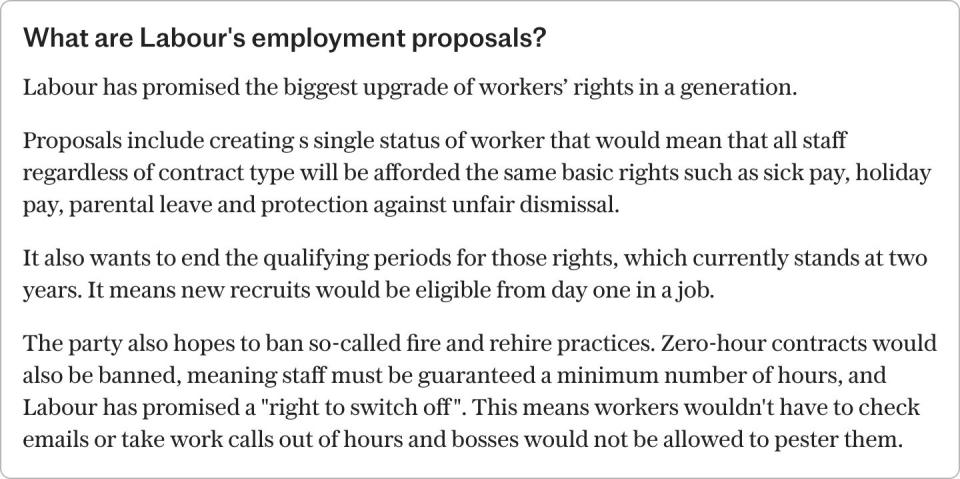Labour’s ‘right to switch off’ for workers attacked

Labour’s proposed ban on after-hours work emails risks pushing down wages, the Institute for Fiscal Studies (IFS) has warned.
The IFS said Labour’s “new deal for working people” would raise costs for businesses and force many to either lower pay or hours to cope.
“It is important not to over-claim: these policies are not a free lunch for workers,” the think tank said. “We would generally expect much, and potentially close to all, of the cost of the benefit to be passed through to lower wages.”
Labour has proposed a raft of pro-worker regulations, including quicker access to statutory sick pay, making paternity leave available to fathers from their first day of employment and a “right to switch off”.
This means that employers are banned from requiring workers to read and respond to emails outside their contracted working hours.
The IFS said that these extra benefits represent costs to employers, which are ultimately passed on to workers.
When it comes to workers on the minimum wage, whose pay cannot be cut, extra benefits “might also slightly increase the risk of job loss for low-paid workers”.
The minimum wage itself has increased rapidly in recent years, jumping by £1.02, or 9.8pc, in April to £11.44 per hour for those aged over 21. The increase has already prompted some employers to curtail hiring and cut hours.
The IFS said: “While for some employees – such as those who particularly value paid sick leave or the right to take paternity leave – that trade-off will be welcome, for others it might not be.”
A Labour spokesman said: “The IFS has got this wrong. Fourteen years of pay stagnation has gone hand-in-hand with growing insecurity and poor enforcement.
“By providing more security at work, we will ensure workers have the confidence to move to better paid jobs. That’s why we will introduce a genuine living wage, extend sick pay and better enforce workers’ rights.
“Labour’s manifesto sets out a plan for wealth creation, to boost productivity, investment, and wages across the country.”
Blizzard of red tape
It came as the Institute of Economic Affairs (IEA) warned that a blizzard of red tape in Labour’s manifesto will place “substantial burdens” on businesses.
The free market think tank claimed Labour’s manifesto contained 62 policies that would increase regulation, while only 13 will ease red tape.
The policies range from strengthening workers’ rights to giving locals first dibs on new homes in their area and tougher regulation of the electricity market.

Matthew Lesh, the IEA’s director of public policy, said the costs associated with these new policies deserved greater scrutiny.
He said: “The major parties are proposing a tsunami of new regulations that could significantly increase costs for businesses and consumers.
“It’s concerning that parties claim to have ‘fully costed’ manifestos while ignoring the substantial costs of their regulatory proposals. Voters deserve transparency about the true impact of platforms on their wallets and the wider economy.”
A smoking ban backed by both Labour and the Conservatives will cost businesses £2bn, the IEA said.
Similarly, a ban on junk food advertising would cost firms another £664m according to government impact assessments.
‘Relatively trivial’ to far-reaching
The Conservative Party has put forward 28 proposals that would increase the regulatory burden and another 20 that would decrease it, according to the report.
The Liberal Democrats are far ahead of both the main parties, with 128 policies increasing regulation and 11 lowering it.
Only Reform UK has proposed removing more red tape than it adds.
The think tank noted that the parties’ plans range from “relatively trivial” to far-reaching.
The Green Party, for example, wants to make hedgehog holes in all new fencing compulsory and ban monkey imports.
The Conservatives want to grant local councils powers to limit holiday lets.
Mr Lesh said: “While some regulations serve important purposes, the sheer volume proposed risks higher prices, lower wages and stifled innovation. Parties should carefully consider the costs and benefits of new rules, rather than defaulting to more red tape in the face of every challenge.”
The report pointed out that some of the heaviest regulated sectors like electricity, housing, childcare and finance had suffered some of the largest price increases in recent decades.


 Yahoo Finance
Yahoo Finance 